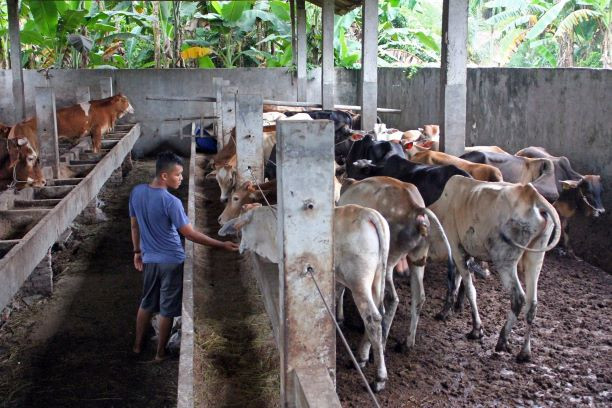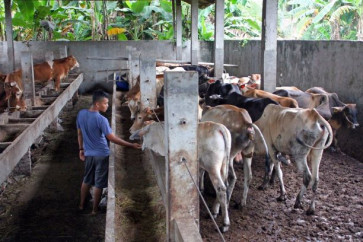Popular Reads
Top Results
Can't find what you're looking for?
View all search resultsPopular Reads
Top Results
Can't find what you're looking for?
View all search resultsThe challenge of ‘qurban’ management and farmers' well-being
The welfare impact of Idul Adha on small-scale farmers is presumed to be minimal, as economic benefits primarily go to traders and logistics businesses.
Change text size
Gift Premium Articles
to Anyone
T
he management of qurban (ritual sacrifice) in Indonesia poses a significant challenge due to the predominant involvement of household farmers in livestock rearing, which represents more than 95 percent of the national share. This encompasses approximately 13 million livestock-rearing households (RTUP) responsible for the well-being of hundreds of millions of animals.
The livestock population encompasses various species, ranging from larger animals like cattle, buffaloes and horses to smaller ones such as goats, sheep and poultry like chickens and ducks.
The main challenge faced by small-scale farmers is their limited scale of operation, which hinders their ability to achieve economic efficiency. However, the commercial poultry farming sector, particularly broiler chickens and layer hens, has successfully scaled up to become a financially viable industry.
As of 2022, the population of layer hens was approximately 378.6 million, with significant numbers in East Java, Central Java, West Java and North Sumatra. Meanwhile, the population of broiler chickens reached 3.2 billion, primarily concentrated in Central Java, West Java, East Java, Banten and North Sumatra.
In 2018, small-scale livestock farming in Indonesia operated at low-scale levels, with average ownership of 3.2 cattle per RTUP for cattle farming, 3.7 dairy cattle per RTUP, 3.6 buffaloes per RTUP, 6.6 goats per RTUP and 25.8 sheep per RTUP. Limited economies of scale lead to high production costs, irregular market supply and an inability to meet significant market demand.
Small-scale farmers lack capital and technology, operating at a subsistence level. Livestock serves as assets for savings and investment, with sales mainly occurring during urgent situations. Idul Adha (Islamic Day of Sacrifice) provides them with opportunities to improve their well-being due to rising prices.
However, weak bargaining power hinders small-scale farmers' interactions with intermediary traders. A majority of farmers owned only a few animals, with 56 percent of cattle/buffalo RTUP and 54 percent of goat/sheep RTUP having 1-2 and 1-4 animals, respectively. This proportion was even higher in regions focused on livestock farming.



















